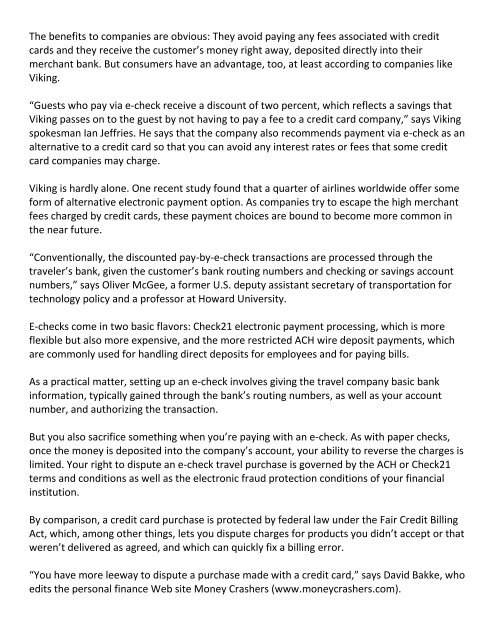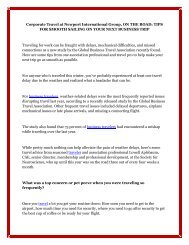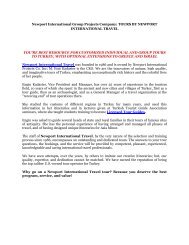Newport International Group Corporate Travel: E-checks are handy, but are they a safe way to pay for travel?
You also want an ePaper? Increase the reach of your titles
YUMPU automatically turns print PDFs into web optimized ePapers that Google loves.
The benefits <strong>to</strong> companies <strong>are</strong> obvious: They avoid <strong>pay</strong>ing any fees associated with credit<br />
cards and <strong>they</strong> receive the cus<strong>to</strong>mer’s money right a<strong>way</strong>, deposited directly in<strong>to</strong> their<br />
merchant bank. But consumers have an advantage, <strong>to</strong>o, at least according <strong>to</strong> companies like<br />
Viking.<br />
“Guests who <strong>pay</strong> via e-check receive a discount of two percent, which reflects a savings that<br />
Viking passes on <strong>to</strong> the guest by not having <strong>to</strong> <strong>pay</strong> a fee <strong>to</strong> a credit card company,” says Viking<br />
spokesman Ian Jeffries. He says that the company also recommends <strong>pay</strong>ment via e-check as an<br />
alternative <strong>to</strong> a credit card so that you can avoid any interest rates or fees that some credit<br />
card companies may charge.<br />
Viking is hardly alone. One recent study found that a quarter of airlines worldwide offer some<br />
<strong>for</strong>m of alternative electronic <strong>pay</strong>ment option. As companies try <strong>to</strong> escape the high merchant<br />
fees charged by credit cards, these <strong>pay</strong>ment choices <strong>are</strong> bound <strong>to</strong> become more common in<br />
the near future.<br />
“Conventionally, the discounted <strong>pay</strong>-by-e-check transactions <strong>are</strong> processed through the<br />
<strong>travel</strong>er’s bank, given the cus<strong>to</strong>mer’s bank routing numbers and checking or savings account<br />
numbers,” says Oliver McGee, a <strong>for</strong>mer U.S. deputy assistant secretary of transportation <strong>for</strong><br />
technology policy and a professor at Howard University.<br />
E-<strong>checks</strong> come in two basic flavors: Check21 electronic <strong>pay</strong>ment processing, which is more<br />
flexible <strong>but</strong> also more expensive, and the more restricted ACH wire deposit <strong>pay</strong>ments, which<br />
<strong>are</strong> commonly used <strong>for</strong> handling direct deposits <strong>for</strong> employees and <strong>for</strong> <strong>pay</strong>ing bills.<br />
As a practical matter, setting up an e-check involves giving the <strong>travel</strong> company basic bank<br />
in<strong>for</strong>mation, typically gained through the bank’s routing numbers, as well as your account<br />
number, and authorizing the transaction.<br />
But you also sacrifice something when you’re <strong>pay</strong>ing with an e-check. As with paper <strong>checks</strong>,<br />
once the money is deposited in<strong>to</strong> the company’s account, your ability <strong>to</strong> reverse the charges is<br />
limited. Your right <strong>to</strong> dispute an e-check <strong>travel</strong> purchase is governed by the ACH or Check21<br />
terms and conditions as well as the electronic fraud protection conditions of your financial<br />
institution.<br />
By comparison, a credit card purchase is protected by federal law under the Fair Credit Billing<br />
Act, which, among other things, lets you dispute charges <strong>for</strong> products you didn’t accept or that<br />
weren’t delivered as agreed, and which can quickly fix a billing error.<br />
“You have more lee<strong>way</strong> <strong>to</strong> dispute a purchase made with a credit card,” says David Bakke, who<br />
edits the personal finance Web site Money Crashers (www.moneycrashers.com).




